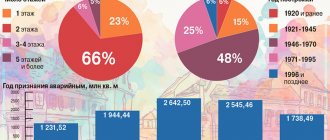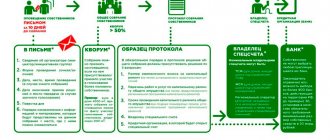A year ago, Federal Law No. 320-FZ of August 3, 2018 on voluntary home insurance came into force. At the same time, legislators recommended that the MA prepare new payments with an optional line about such a service, but no changes were made to the legal acts. Using the example of a court case, we tell you whether the MA can indicate such an additional service in the payment document.
Additional services of the management authority and the conditions for their provision to residents of the house
100600
No. 320-FZ established the rules of home insurance for owners of premises in apartment buildings
On August 4, 2021, Federal Law No. 320-FZ of August 3, 2018 came into force, which introduced rules for home insurance against emergencies. The Government of the Russian Federation then emphasized that the service would be optional: residents of houses would be able to refuse it if they wished. Managing organizations were instructed to prepare new payment documents with a line on voluntary insurance.
One of the management organizations from the Sverdlovsk region not only prepared an invoice, but also entered into an agency agreement with an insurance company and began charging for such an additional service. One of the residents of the apartment building complained about this to the State Housing Authority. The department conducted an unscheduled inspection and issued an order to the administrative authority, demanding that the residents of the building stop paying for voluntary insurance of the apartment.
The UO considered that this violated its rights and interests and went to court with a demand to declare the order of the GZhN body illegal. In court, the company insisted that the disputed line in the payment documents was not any additional service or work for managing an apartment building. This is an offer to conclude a contract of voluntary insurance of civil liability apartments with an insurer.
Insurance squared
Let me remind you that the Moscow home insurance program is already 25 years old - it was launched back in 1995 to encourage city residents to insure their apartments against accidents and emergencies, including fires, explosions, floods, etc. At that time, many were skeptical about insurance, which is why in critical situations they found themselves face to face with disaster.
“Over 25 years of successful work, the program has fulfilled its mission: a comprehensive insurance system in the housing sector has been formed in the capital,” the department explained to RG. — Now Muscovites can work with insurance market professionals directly without an intermediary represented by the city. Obligations under existing contracts concluded within the framework of the program will be fulfilled in full.” However, the city program has features that cannot be found in regular commercial insurance. Firstly, the low price - citizens were charged 1.96 rubles per square meter per month. It was possible to pay once a year, then it would be 23.52 rubles per square meter. With a three-ruble note with an area of 70 sq. m payment for the year was slightly less than 1650 rubles. Upon the occurrence of an insured event, payments were limited to 44 thousand rubles for the same “square”. Regular commercial insurance under similar conditions costs at least twice as much - the RG correspondent found few options cheaper than 4 thousand rubles.
Many experts regret the closure of the city program. Lawyer of the S&K Vertical bureau Alexandra Stirmanova notes that thanks to a well-developed and transparent mechanism, it was able to exist for a quarter of a century. “The cancellation of the program will significantly worsen the situation of the owners; we are, of course, talking about the low-income category of the population, who, in addition to the rise in price of the insurance product, will face the problem of independently searching and choosing an insurance organization,” she notes.
Insurers believe that if the program is cancelled, at least a million Moscow families will be left without the usual way of protecting their home. “Having a municipal insurance policy was a guarantee of restoration of real estate in the event of unforeseen circumstances. For example, in 2021, we paid almost 1 million rubles to two Moscow families for a fire in an apartment. At the same time, the amount of the monthly payment for the policy was only 146 rubles, which is 6-7 times lower than in commercial insurance,” the press service explained to RG. Along with it, four other large insurers participate in the city program.
In total, over 25 years, more than 205 thousand insurance cases were settled under the program, for which the victims were paid almost 4 billion rubles. “So, in 2021, 3,129 families received insurance compensation in the amount of 128 million rubles,” the city property department told RG. The amount is decent, but only part of this money was paid by the insurance companies; 15% of the amount of payments was borne by the city.
Over 25 years, 205 thousand insurance cases were settled
Many experts indicate that one of the reasons for the cancellation of the program could be large fees from insurance companies against the backdrop of much smaller payments. Yes, Muscovites paid little under voluntary insurance, but the coverage was enormous. Let's do the math - only from a million apartments with an area of 50 square meters. m per year there will be almost 1.2 billion payments. At the same time, payments for all 25 years did not reach 4 billion.
Be that as it may, many Muscovites will now have to carefully study the insurance market in order to find a suitable replacement for the city program. Commercial insurance, of course, also has advantages - in them you can choose the amount of insurance coverage yourself and expand the list of insured events. For example, you can insure yourself not only against fire and a neighbor’s flood, but also against robbery. But all this will also increase the cost of insurance.
The management authority cannot include a line about voluntary insurance in the receipt for housing and communal services without the approval of the OSS
When making its decision, the court of first instance referred to clause 69 of the RF PP No. 354, which established the requirements for the execution of a payment document and listed the information that must be indicated in it. The form of invoice for housing and communal services is established by the Ministry of Construction of the Russian Federation (clause 71 of the Russian Federation Regulation No. 354). Information about payment for voluntary insurance services is not included in the list of information to be included in the payment document.
Insurance is carried out on the basis of contracts concluded by a citizen or legal entity with a specialized organization (Part 1 of Article 927 of the Civil Code of the Russian Federation). In accordance with Part 2 of Art. 940 of the Civil Code of the Russian Federation, such an agreement can be concluded by drawing up one document or delivering it to the policyholder on the basis of his written or oral statement signed by the insurer.
Collection of payments for voluntary insurance is not included in the services provided by the management authority under the management agreement for an apartment building and payable to consumers. The conclusion of an insurance contract and payment for these services is the right of the owners of residential premises. In violation of the requirements of Art. 65 of the Arbitration Procedure Code of the Russian Federation, the plaintiff company did not prove that the OSS decided to conclude an insurance contract.
Accordingly, issuing payment for voluntary insurance services in invoices for housing and communal services is beyond the scope of the authority of the management authority under the management agreement. The court of first instance rejected the company's demands and upheld the order of the State Housing Authority in force.
Changes in housing legislation in 2021: part two
122050
What is this service
Russian citizens have the opportunity to voluntarily insure their property. Several years ago, a voluntary real estate insurance program was introduced.
Almost every person knows what voluntary insurance is. Insurance allows a person not to be left without housing if unforeseen circumstances arise that result in the building being destroyed or damaged.
Thus, a citizen who owns property can contact any insurance company (IC) that has permission to carry out such activities. The parties enter into an agreement according to which the insurer will be obliged to make an insurance payment upon the occurrence of an insured event. The procedure for carrying out the procedure and fulfilling obligations is regulated by Article 21 of the Housing Law[1] and the Law of the Russian Federation No. 4015-1 “On the organization of the insurance business in the Russian Federation”[2].
The subject of the contract is mainly: an apartment or other housing, a vehicle and life. A person who insures his apartment or house is obliged to make monthly contributions to the company.
Housing and communal services employees can become an intermediary between the owner and the company, in which case a preferential insurance agreement is created. For this reason, a new column appears on the receipt, without the owner’s permission. In this case, the payer has the right to refuse the service by simply ceasing to pay the fee. Or he can confirm his will and make monthly contributions.
Late payment will result in suspension of the agreement. And if a critical situation occurs, the insurance company will be released from all its obligations. Therefore, it is better to transfer money every month, without skipping.
On a note
The UO attempted to challenge the findings of the appellate instance by appealing to the cassation court. The company indicated that the amounts for payment of housing and communal services and the amounts taking into account property insurance are posted separately, providing the owner with the opportunity to voluntarily and consciously make payments. This prevents the owners of premises in an apartment building from being misled regarding the obligation to pay such a fee.
At the same time, in the opinion of the Managing Director, the general meeting of owners does not have the right to make decisions on voluntary insurance of premises that are not the common property of the owners of premises in an apartment building. If such decisions are made, they will be void due to Part 3 of Art. 181.5 of the Civil Code of the Russian Federation. However, the judge noted that all the company’s arguments were based on an incorrect interpretation of substantive law and also rejected the complaint, approving the decision of the court of first instance on the legality of the order of the State Housing Authority.
Thus, as the courts of three instances indicated in case No. A60-58964/2019, the management organization cannot, without a decision of the general meeting of owners, include any additional services in the payment document for housing and communal services, including under an agency agreement with a third party.






![Mortgage for civil servants and other public sector employees in Sberbank in [year]](https://2440453.ru/wp-content/uploads/ipoteka-dlya-gossluzhashchih-i-drugih-byudzhetnikov-v-sberbanke-v-year4-330x140.jpg)



